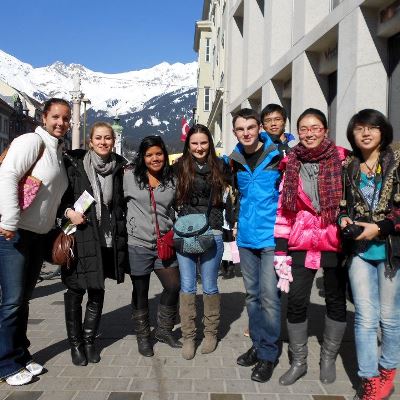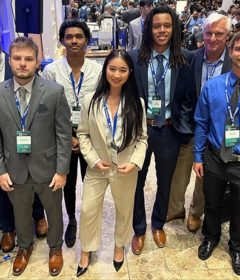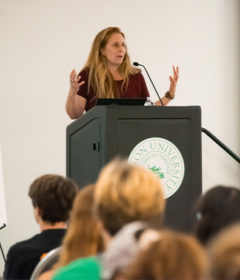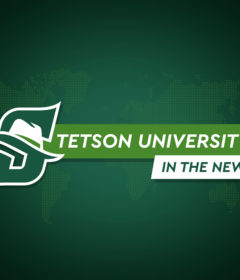Bringing Global Home
 Study abroad. Perhaps no other experience has the ability to so swiftly and absolutely change students’ lives and prepare them for any opportunity the world might offer. (Stetson students are pictured, right, in Innsbruck, Austria.)
Study abroad. Perhaps no other experience has the ability to so swiftly and absolutely change students’ lives and prepare them for any opportunity the world might offer. (Stetson students are pictured, right, in Innsbruck, Austria.)
It’s widely acknowledged that immersing yourself in another culture and language stretches your view of the world. It provides experience in managing and navigating unique situations. It develops your confidence and helps you achieve personal growth while imparting concrete skills that last a lifetime. Not only are these core characteristics that we seek to instill in our students at Stetson University, but they are also critical – with a nod to Thomas Friedman– to navigating our shrunken, flattened world.
However, presented with opportunities to study abroad, most of our students are limited by cost, not desire. Stetson’s 2012 National Survey of Student Engagement (NSSE) shows that while 56 percent of first-year students plan to study abroad, only 27 percent of our seniors have actually made it happen.
With such a gap, it’s small consolation that Stetson does better than the national average: According to the 2013 Open Doors Report released last week by the Institute of International Education (IIE), fewer than 10 percent of U.S. undergraduates study abroad even though that number is at an all-time high.
I was 25 and supporting myself in grad school the first time I went abroad, as my family couldn’t afford to send me overseas before then. Now I see what I missed.
While our goal is to make it possible for every Stetson student to study abroad, our responsibility is to also bring the world to them – infusing the campus with an increased awareness of intercultural and international issues.
This is especially true right now during International Education Week. Stetson’s campus programming (found on WORLD: International Learning website) includes Hispanic poetry and a view of Putin and Russia’s contemporary political scene. We look at the origination of Pow Wows, welcome international diplomats, become involved in an NGO helping Zambian children achieve their dreams, and explore Asian identity.
International experiences – whether they are internships and service-learning experiences abroad or using technology to share musical performances across the oceans – are most essential for students engaged in global studies and developmental issues.
“It is only through international education and exposure,“ says Poorna Selvaraja, a psychology major and WORLD Peer Advisor at Stetson, “that we can learn and recognize the similarities that unite us as a race instead of focusing on the differences that separate us.”
This extends to faculty, too, whose global engagement results in expanded perspectives within classrooms for all students, opportunities for outstanding research, internationalization of our curriculum, and new study abroad opportunities. It is critical that faculty attend conferences in the field of interdisciplinary academic pedagogy and global trends, and we must bring guest speakers and practitioners to campus to interact with students in their coursework and fieldwork.
Engaging with global partners via technology could include co-teaching with overseas faculty, creating student and faculty dialogue with their international counterparts and directly integrating those conversations into our courses, leveraging international events to enable virtual participation from anywhere, and targeting online resources to ensure all of our courses have intercultural components.
And, of course, this means increasing the number of international students on campus. Approximately five percent of Stetson’s student body this year comes from 55 countries, which gives our U.S. students rich exposure to other cultures in one of the best possible ways.
As I spend time with our students and witness their enthusiasm for making a difference in the world, I know we have an obligation to provide tomorrow’s leaders with experiences that will prepare them for meaningful work and lives – in government service, non-governmental organizations, health fields or in meeting other global needs.
Our students recognize more than ever that a life truly worth living is found outside their comfort zone.
By President Wendy B. Libby, Ph.D.
Stetson University
You can also read this on Wendy Libby’s blog on Huffington Post.



